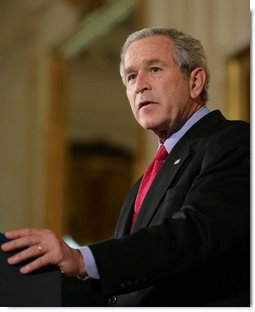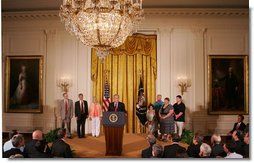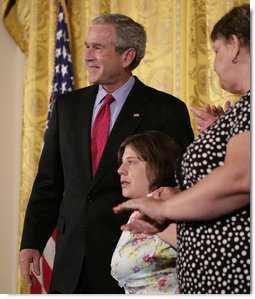June 20, 2007
2:39 P.M. EDT
THE PRESIDENT: Welcome. I'm glad you're here. America is a nation that leads the world in science and technology. Our innovative1 spirit is making possible incredible advances in medicine that could save lives and cure diseases. America is also a nation founded on the principle that all human life is sacred -- and our conscience calls us to pursue the possibilities of science in a manner that respects human dignity and upholds our moral values.
 I appreciate the fact that we're joined by a lot of folks who share the deep desire to advance science, and at the same time, uphold our moral values. I appreciate the fact that Mike Leavitt is here, Secretary of the Department of Health and Human Services. I want to thank the members of the United States Congress and Senate who have joined us. I thank you for taking your time to be here on this important announcement today.
I appreciate the fact that we're joined by a lot of folks who share the deep desire to advance science, and at the same time, uphold our moral values. I appreciate the fact that Mike Leavitt is here, Secretary of the Department of Health and Human Services. I want to thank the members of the United States Congress and Senate who have joined us. I thank you for taking your time to be here on this important announcement today.
I'm joined on stage by two good docs, really smart, capable people: Dr. Bill Hurlbut, Professor of Stanford University Medical Center; Dr. Don Landry, Professor at Columbia University Department of Medicine -- actually, he's the Chairman of the Department. The reason they're here is these are brilliant biologists who are seeking new ways to develop stem cell lines without violating human life. And these are smart folks, and I cannot thank them enough for coming to the Oval Office to share with me their wisdom and their vision.
I'm also up here with Carol Franz; she has whipped cancer twice by using adult stem cells. In other words, adult stem cells have saved her life. She's a determined2 woman who believes strongly that there are different alternatives available to use stem cells other than those which are created as the result of destruction of human life.
And, finally, I'm up here with the McNamara family -- Kaitlyne is with us -- I'm going to talk about her in a second.
I do want to thank the other stem cell patients and researchers and advocates who are here with us today. If you're not in any of those categories you're welcome, too. (Laughter.)
In 2001, I announced a policy to advance stem cell research in a way that is ambitious, ethical3, and effective. I became the first President to make federal funds available for embryonic5 stem cell research -- and my policy did this in ways that would not encourage the destruction of embryos6. Since then, my administration has made more than $130 million available for research on stem cell lines derived7 from embryos that had already been destroyed. We've provided more than $3 billion for research on all forms of stem cells -- including those from adult and other non-embryonic sources.
This careful approach is producing results. It has contributed to proven therapeutic8 treatments in thousands of patients with many different diseases. It's opening the prospect9 of new discoveries that could transform lives.
 Congress has sent me a bill that would overturn this policy. If this legislation became law, it would compel American taxpayers10 -- for the first time in our history -- to support the deliberate destruction of human embryos. I made it clear to Congress and to the American people that I will not allow our nation to cross this moral line. Last year, Congress passed a similar bill -- I kept my promise by vetoing it. And today I'm keeping my word again: I am vetoing the bill that Congress has sent. (Applause.)
Congress has sent me a bill that would overturn this policy. If this legislation became law, it would compel American taxpayers10 -- for the first time in our history -- to support the deliberate destruction of human embryos. I made it clear to Congress and to the American people that I will not allow our nation to cross this moral line. Last year, Congress passed a similar bill -- I kept my promise by vetoing it. And today I'm keeping my word again: I am vetoing the bill that Congress has sent. (Applause.)
Destroying human life in the hopes of saving human life is not ethical -- and it is not the only option before us. We're already seeing remarkable11 advances in the science and therapeutic uses of stem cells drawn12 from adults and children, and the blood from umbilical cords -- with no harm to the donor13. Researchers value embryonic stem cells because they are pluripotent -- which means that they have the potential to develop into nearly all the cell types and tissues in the body. Researchers are now developing promising14 new techniques that offer the potential to produce pluripotent stem cells -- without having to destroy human life.
For example, several new studies released earlier this month showed the potential of reprogramming adult cells -- such as skin cells -- to make them function like embryonic stem cells. It's exciting new research taking place in the United States of America. Scientists from all over the country hailed this as an important breakthrough. And I'm pleased to report to you that my administration and the NIH helped fund this exciting work. The taxpayers' dollars are going to new kinds of therapies, new kinds of science, new kinds of work that do not cross a moral and ethical line.
A few months earlier, scientists discovered that cells extracted from amniotic fluid and placentas could also provide stem cells that seem to do what embryonic cells can. Still other researchers are investigating how to combine reprogramming and other innovative techniques to produce stem cells with the abilities of embryonic stem cells -- without creating or destroying embryos. There's a lot of interesting work going on that's ethical and moral. Scientists are exploring ways to collect stem cells in the same manner that doctors now rescue organs from patients who have died.
With us today are patients who are benefiting from ethical stem cell research -- including Kaitlyne McNamara. Kaitlyne was born with spina bifida, a disease that damaged her bladder. None of the treatments her doctor tried had worked; she was in danger of kidney failure. Then her doctors took a piece of her bladder, isolated15 the healthy stem cells, and used them to grow a new bladder in a laboratory -- which they then transplanted into her. And here she stands, healthy. (Applause.) Scientific advances like this one are important and should give us hope that there's a better way forward than scientific advances that require the destruction of a human life.
 The researchers pursuing these kinds of ethically16 responsible advances deserve our support, and there is legislation in Congress to give them that support. Recently, the United States Senate passed a bill sponsored by Norm Coleman and others that would authorize17 additional federal funding for alternative stem cell research. The bill was approved with the backing of 70 United States senators. The House leaders need to pass similar legislation that would authorize additional funds for ethical stem cell research. That would be an important advancement18. It would be an important statement. Because we can't lose the opportunity to conduct research that would give hope to those suffering from terrible diseases -- and help this country move beyond the controversies19 over embryo4 destruction.
The researchers pursuing these kinds of ethically16 responsible advances deserve our support, and there is legislation in Congress to give them that support. Recently, the United States Senate passed a bill sponsored by Norm Coleman and others that would authorize17 additional federal funding for alternative stem cell research. The bill was approved with the backing of 70 United States senators. The House leaders need to pass similar legislation that would authorize additional funds for ethical stem cell research. That would be an important advancement18. It would be an important statement. Because we can't lose the opportunity to conduct research that would give hope to those suffering from terrible diseases -- and help this country move beyond the controversies19 over embryo4 destruction.
We have a good chance to put aside all the politics and focus on a good piece of legislation that advances science and doesn't cross an ethical line. Norm, I want to thank you and Johnny Isakson for sponsoring that piece of legislation. (Applause.)
In the meantime, my administration is taking immediate20 action to increase our support for researchers in their vital work. Earlier today, I issued an executive order to strengthen our nation's commitment to research on pluripotent stem cells. This order takes a number of important steps. The order directs the Department of Health and Human Services and the NIH to ensure that any human pluripotent stem cell lines produced in ways that do not create, destroy, or harm human embryos will be eligible21 for federal funding.
The order expands the NIH Embryonic Stem Cell registry to include all types of ethically produced human pluripotent stem cells. The order renames the registry -- calls it this, the Pluripotent Stem Cell Registry -- so it reflects what stem cells can do, instead of where they come from. The order invites scientists to work with the NIH, so we can add new ethically derived stem cell lines to the list of those eligible for federal funding. I direct Secretary Leavitt to conduct an assessment22 of what resources will be necessary to support this important new research.
This science which does not cross ethical lines requires money. I believe it is a good use of taxpayers' money to spend money on this kind of science and research. And Michael is going to expedite it, that's what that means -- it's a fancy paragraph for saying he's going to get it done. (Laughter.)
With these steps, we'll encourage scientists to expand the frontiers of stem cell research. We want to encourage science. We want to say, we stand on your side in an ethically responsible way. Scientists have recently shown they have the ingenuity23 and skill to pursue the potential benefits of pluripotent stem cell research. Here's two of them right here. That's why they're standing24 here, they have showed what's possible. I have confidence in their abilities to continue to develop new techniques. With our expanded support of non-destructive research methods, we'll make it more likely that these exciting advances continue to unfold.
Technical innovation in this difficult area is opening up new possibilities for progress without conflict or ethical controversy25. So I invite policymakers and scientists to come together to speed our nation toward the destination we all seek -- where medical problems can be solved without compromising either the high aims of science or the sanctity of human life.
Thank you all for coming. May God bless. (Applause.)
END 2:52 P.M. EDT
 收听单词发音
收听单词发音 
 I appreciate the fact that we're joined by a lot of folks who share the deep desire to advance science, and at the same time, uphold our moral values. I appreciate the fact that Mike Leavitt is here, Secretary of the Department of Health and Human Services. I want to thank the members of the United States Congress and Senate who have joined us. I thank you for taking your time to be here on this important announcement today.
I appreciate the fact that we're joined by a lot of folks who share the deep desire to advance science, and at the same time, uphold our moral values. I appreciate the fact that Mike Leavitt is here, Secretary of the Department of Health and Human Services. I want to thank the members of the United States Congress and Senate who have joined us. I thank you for taking your time to be here on this important announcement today.  Congress has sent me a bill that would overturn this policy. If this legislation became law, it would compel American
Congress has sent me a bill that would overturn this policy. If this legislation became law, it would compel American  The researchers pursuing these kinds of
The researchers pursuing these kinds of 

